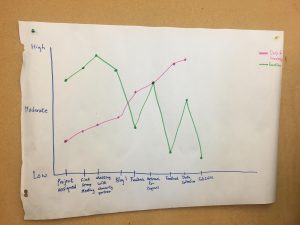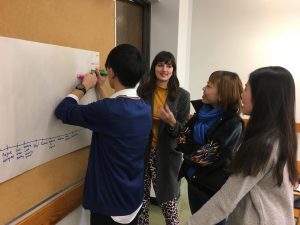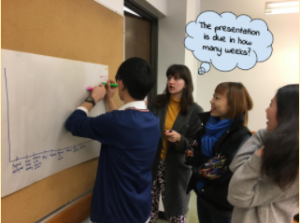Strategies for a Graceful Dismount
This week’s agenda! (Week 9: March 5th – 11th)
What we aimed to accomplish
- Create blog #3
- Receive feedback from Anne about excel spreadsheet
- Edit and resubmit blog # 2
- Contact and arrange for in person interviews between March 12th and March 16th
What we’ve done so far:
- Updated the spreadsheet of list of grocery stores and specialty stores
- Made changes to this list after receiving feedback on spreadsheet from Anne
- Completed blog #3
Moment of Significant Change

Reflecting on Moments of Emotional Significance
During week 8’s tutorial workshop, we were asked to map out any significant moments and how they impacted our emotions and knowledge base.
Throughout our project planning and first stages of execution we shared several emotional ups and downs. Spirits were high in January as we began this new project in new term with a new group of peers. Although slightly intimidated by the scope of our assigned task, getting to know each other’s motivations for choosing the RFAM project and meeting with our community partner in Richmond was inspiring.
However, in the following couple weeks, we faced several disappointments. We had a extremely hard time dealing with the blog because none of us had such experience before. Also, due to the limited background information of our project, the project proposal was considered to be the most tough part in this project. Everyone felt quite anxious as soon as we received feedback of our proposal from the TA as well as the community partners. We were still trying to figure out the best way to organize our work and working together as a team. No one is perfect, we tried to learn from our mistakes. To better complete this project, each person was assigned with a particular role based on personal strength. The change of strategy helped us work together more efficiently as a whole, which was significantly reflected in the data collection stage.
“Everything is hard before it is easy.” – Johann Wolfgang von Goethe
Skill and knowledge development
We have acquired a lot of knowledge about our project and the Richmond community during the first seven weeks. At first, we obtained the basic information on paper either from our community partners or from our researches online. As the project progresses, we are able pick up more information and advice with the support from Anne. We then became more aware of the focus of this project which had greatly enhanced our knowledge and skills.
New skills developed:
- Communication skills with group members, community partners as well as community organizations via email or over the phone
- Skills in collecting current and accurate information using various approaches
- Increase proficiency with Microsoft Excel spreadsheets
Our Takeaways from the Exercise
We are glad to have had the opportunity to reflect on each members feelings all together because it allowed for a level of reflection not often realized in any of the group projects we have previously worked on. When asked in tutorial to plot our ‘e m o t i o n s’ and ‘k n o w l e d g e’ over time we honestly were a bit hesitant. As budding scientists all too familiar with transforming data into graphs (and eliminating bias from results), the idea of taking our own feelings and placing them on an emotional axis seemed uncomfortable. Sharing our vulnerabilities allowed us to truly be on the same page.
The visual the graph provided made it very clear there is still work to be done when it comes to receiving critiques. It helps us to realize what needs to be improved on to better achieve our goals for the project by acknowledging our limitations as a team. It provided an opportunity for all of us to come together reflecting on the completed work as well as opening up ourselves to one another. This enables us to be more determined on our objectives and strengthen our team spirit. On the whole, this exercise proved to be a great tool to improve some of the weaknesses we may have as a team.
Strategy for Successful Project Completion
Communication

As a group, we all agree that communication is always the #1 factor in successful project completion. It is the foundation of project management and the key in completing goals in an effective and timely manner. Checking our group chat frequently allows us to answer each other’s questions more quickly or update each other on new developments. Proper communication is not only necessary within our student team, but also with our community partner. Anne has been providing us with helpful and detailed feedback for every document we had emailed her. We really appreciate her thoroughness. (Thank you Anne!)
Evaluating and Improving Our Strategy
 Everytime we received feedback from either our TA or our community partner it’s a opportunity to improve rather than a disappointment. We can utilize the constructive criticism to prepare our final draft and understand what to look out for in the future. It is very important to learn from your mistakes so you don’t make the same mistake again.
Everytime we received feedback from either our TA or our community partner it’s a opportunity to improve rather than a disappointment. We can utilize the constructive criticism to prepare our final draft and understand what to look out for in the future. It is very important to learn from your mistakes so you don’t make the same mistake again.
Setting Early Deadlines
Due to everyone’s busy schedule, we find that it is important for us to create a “false” deadline 1-2 days earlier than the official assignment due date. This strategy allows us to ensure every assignment will be submitted on time and we will not be rushing last minute. Hopefully this will help us improve our time management abilities.
 Creating to-do lists
Creating to-do lists
Task management can be confusing and difficult when there are five people in a group, especially when there are multiple deadlines approaching. By creating to-do list we prevent any confusion among our group and allow for ease in completing assignments.


